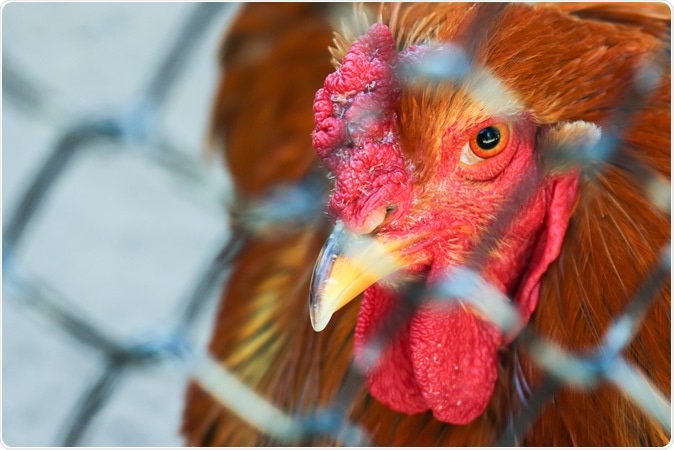China has reported an outbreak of the H5N1 bird flu in Hunan, which borders the province of Hubei, the epicenter of the novel coronavirus outbreak.
The new bird flu outbreak was reported on Feb. 1 in the Shuangqing district of Shaiyang City. The farm had 7,850 chickens, with 4,500 dying from the virus. Local authorities have culled more than 17,000 poultry and destroyed eggs after the reported outbreak, in the hopes to curb the spread of the virus.

The new bird flu outbreak was reported on Feb. 1 in the Shuangqing district of Shaiyang City. Image Credit: Campre / Shutterstock
This comes as the coronavirus 2019-nCoV outbreak death toll in China has risen to 371 with more than 17,000 confirmed infections, 21,558 suspected cases and 152,700 people "under medical watch".
What is the H5N1 bird flu?
According to the United States Geological Survey, the bird flu is considered highly pathogenic and potent based on its ability to kill birds.
“The designation of low or highly pathogenic avian influenza refers to the potential for these viruses to kill chickens. The designation of “low pathogenic” or “highly pathogenic” does not refer to how infectious the viruses may be to humans, other mammals, or other species of birds,” USGS posted on its website.
It added that most strains of the avian influenza are not highly pathogenic and may cause just mild symptoms in wild birds. On the other hand, low-pathogenic strains in poultry can easily mutate into highly pathogenic strains, causing contagious and severe illness, which may lead to death among birds and chickens.
Avian influenza or bird flu is caused by the avian influenza Type A viruses, which occur naturally among wild aquatic birds found across the globe. The virus can infect domestic poultry and other birds. Though the virus does not normally infect humans, there were reported sporadic human infections in the past.
The H5N1 avian influenza or bird flu was first detected in 1196 in Chinese geese, and the first human transmission was reported in 1996. In 2003, the avian influenza cases in humans reemerged in 2003.
Human transmission reports
As of writing, Chinese officials reported that there are no cases of the H5N1 in humans. The World Health Organization (WHO) states that the bird flu virus can spread to humans but in just rare cases. Also, the transmission from human to human is unlikely. Those who develop the infection are those working closely with infected birds, such as farmers.
If a human acquires the infection, the signs and symptoms include mild to severe influenza-like illness, such as fever, sore throat, cough, and muscle pain, among others. Other signs of an infection with the virus include diarrhea, abdominal pain, severe respiratory illness, conjunctivitis, pneumonia, neurological changes, and multiple organ failure.
Amid the coronavirus outbreak
The H5N1 bird flu outbreak occurs while China is still figuring out how to contain the spread of the novel coronavirus (2019-nCoV) that has sickened more than 17,000 people and killed 300 in the country.
The virus outbreak, which started late in December 2019, is highly contagious with about 23 countries reporting confirmed cases. There are an estimated 150 cases of the infection outside China. The cases recorded in Japan, France, Vietnam, Thailand, Germany, the United States, and Taiwan were patients who had not been to China, hinting human-to-human transmission of the infection.
On Jan. 31, the Philippines reported two confirmed cases and one death related to the Wuhan coronavirus, the first death outside of China.
The World Health Organization (WHO) declared the outbreak as a global health emergency, prompting immediate response across the globe to contain the virus. Many countries, including the Philippines, have imposed travel bans in flights coming from mainland China.